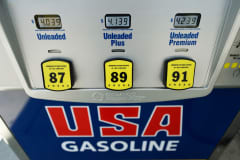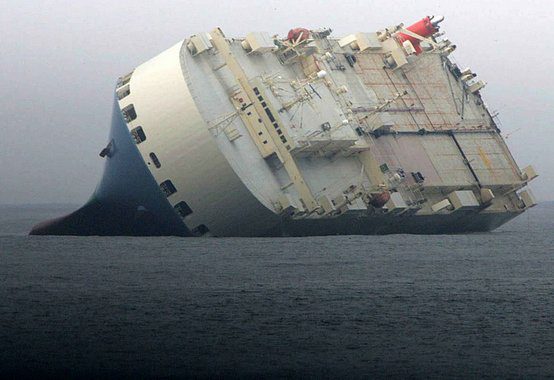Published: Wednesday, 24 Jul 2013 | 3:02 PM ET
By: Lori Ann LaRocco | CNBC Senior Talent Producer

Getty Images
Gas prices are displayed at a USA Gasoline station in Los Angeles, California.
Gasoline
costs in the U.S. could fall as much as 30 cents a gallon if lawmakers
would repeal a controversial shipping law, industry experts say.
The longstanding Jones Act—a section of The Merchant Marine Act of 1920—which requires any ship that carries goods or commodities in U.S. waters be American made, owned, operated and carry a U.S. flag, is being highlighted by one oil CEO as a reason behind the high price of gasoline in the U.S. and particularly in Florida.
"If foreign owned and flag ships were able to carry gasoline in US waters, the price of gasoline in the North East and in Florida could be 20 to 30 cents lower," Joe Petrowski, CEO of Gulf Oil, said.
(Read more: Watch out, US crude prices could correct 35%: Pro)
Petrowski added it also makes environmental sense.
The longstanding Jones Act—a section of The Merchant Marine Act of 1920—which requires any ship that carries goods or commodities in U.S. waters be American made, owned, operated and carry a U.S. flag, is being highlighted by one oil CEO as a reason behind the high price of gasoline in the U.S. and particularly in Florida.
"If foreign owned and flag ships were able to carry gasoline in US waters, the price of gasoline in the North East and in Florida could be 20 to 30 cents lower," Joe Petrowski, CEO of Gulf Oil, said.
(Read more: Watch out, US crude prices could correct 35%: Pro)
Petrowski added it also makes environmental sense.
Has oil topped out?
Oil drops from its 16-month high. The crude outlook, with CNBC's Jackie DeAngelis and the Futures Now Traders.
Vessels made in the United States are more than triple the price tag of their international competitors.
A mid-sized product tanker called an MR Tanker costs $130 million in the United States versus $34 million in Korea, and a 4800 TEU (20-foot equivalent unit) container ship would have a price tag of $200 million in the U.S. vs. $46 million in South Korea, according to Marine Money International.
Shipping insiders say the "American Made" mandate has had a negative impact on the U.S. transportation system.
(Read more: No glut here: Why Gulf refiners face a squeeze)
"The high cost of U.S. ship construction coupled to the Jones Act's absolute prohibition on the importation of foreign-built vessels has led to an inefficient major domestic transportation market sector saddled with an artificial shortage of ships, while the world is actually well supplied with modern and safe tonnage." said Michael Hansen, president of the Hawaii Shippers Council.
The council has its own reform proposal addressing the impact of the Jones Act on Alaska, Guam, Hawaii and Puerto Rico.
This is not the first time the price tag of the Jones Act has been talked about.
Ed Morse, chief commodity analyst at Citigroup, has said publicly the Jones Act adds between $6 and $8 a barrel to transport costs. Morse has said that based on his calculations, it's often cheaper for a Gulf Coast refiner to send gasoline to Brazil than to New York.
Per Heidenreich of private investment company Heidenreich Enterprise said that while he has no personal knowledge of how Petrowski came up with his calculations, he doesn't disagree and stressed the price of gasoline is also being jacked up in California.
(Read more: CFTC charges energy trading firm with 'spoofing')
"I will not doubt his calculations considering the domestic freight on tankers have increased on time charter basis to about $100,000 per day (compared to foreign-flag equivalent ships that earn about $12,000 per day)," Hedenreich said.
"There are also 17 or so Jones Act tankers that carry crude from Alaska to California that add to the cost of energy at the pump in California," he continued. "With Exxon's two new buildings under construction at Aker Philadelphia Shipyard at cost in excess of $200 million each, tankers that will replace old Jones Act tankers in the Alaskan/California trade this will sure increase the price at the pump in California."
Supporters of the Jones Act vehemently disagree with those who blame higher gasoline prices on the Jones Act.
Michael Roberts, senior vice president and general counsel of Crowley Maritime, noted that domestic shipping capacity is higher now than a year ago.
"This would tend to drive gasoline prices lower, not higher," Roberts said.
He also noted that marine transportation makes up a tiny fraction of the overall cost of gasoline.
The incremental cost of using American vessels and crews in U.S. domestic trade is also very small, "more like a tenth of a penny per gallon at the pump. I just don't see any truth in those numbers."
The price of fuel expands beyond the pump.
Read More Here
************************************************************
The American Conservative
Jonesing for Relief from Port Protectionism
Jacksonville, Florida, brings in coal from Colombia rather than West Virginia. Livestock farmers in Texas buy grain from Argentina instead of from America. Puerto Rico’s port at San Juan is losing shipping volume, even as the Port of Kingston in Jamaica is gaining it.
Why? Because an antiquated maritime law, the Jones Act, requires that all transport of cargo between two United States ports be carried by ships that are U.S.-owned, U.S.-built, U.S.-manned, and flagged in the United States.
That is, a ship from South Korea cannot go to Hawaii and then to San Fransisco. Foreign ships could not help with the BP oil spill cleanup without waivers.
William Keli’i Akina, the president of the Hawaiin think tank the Grassroots Institute, likens the law to a hostile blockade against Hawaii and Puerto Rico. But the vested interests that defend it—U.S. vessel owners, shipyards, unions, overland transporters—are so powerful that the last five presidents have all vocally supported it. Don’t expect repeal any time soon.
Read More Here
************************************************************
Related articles











No comments:
Post a Comment
Hello and thank you for visiting my blog. Please share your thoughts and leave a comment :)